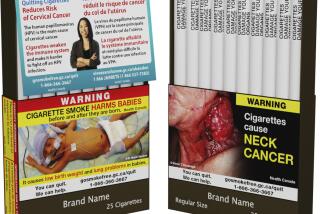France Trying to Clear Air on Smoking
- Share via
This column is being written while I’m visiting France. Alas, it’s a country with an air pollution problem. Not exactly like Southern California’s, but very big and annoying nevertheless. As a visitor, you experience it in the form of “secondary smoke,” identified as a cancer threat affecting nonsmokers.
Secondary smoke, of course, isn’t just a problem in France. In response to it--and over objections by smokers--the city of Moorpark recently banned smoking from all public buildings and restaurants. Thousand Oaks is considering doing the same thing.
But one wonders if that could happen in France.
The difference is, in France everybody smokes. Everybody. They start at 14 and never stop. Amazingly, they have cut back on consuming wine and other alcohol--for the first time in memory, more than half the adult population doesn’t drink at all.
Still, they smoke like fiends. We’re talking about a population that is never without a lighted ciggie in their mouths and never without a pack at the ready in their hands. They’re killing themselves and they’re killing me.
You begin to notice it on the flight from L.A. to Europe. The smoking section is quickly filled with smoke, in the midst of which you can see papers with words like Monde and Nouvel at the top.
The French government is not unaware that secondary smoke is a problem. It decreed this spring that there shall be nonsmoking zones in bars and restaurants.
Smokers, however--that is to say, everybody--decided to ignore the decree. The police got involved. There were media-event arrests and citations issued. It also didn’t take long for inspired wickedness, such as putting up “Smoking Section” signs on all four walls of restaurants and a “No Smoking” sign on the bathroom door.
Despite such shenanigans by the common folk, the government itself remains serious about the smoke problem--secondary as well as primary. A year ago, it banned cigarette advertising. Not just on TV, but everywhere, right down to forbidding Marlboro ads on Formula One race cars. It was a move that nearly caused races to be canceled in protest.
The government here has several reasons to play hardball. Smoking-related health problems have been a major drain on the national treasury. Treatment of cancer and heart disease--required by longtime smokers and smoke breathers such as children and asthmatics--is eating up an increasing percentage of the funds appropriated for the National Health Plan.
The French plan is similar in costs and benefits to the Canadian system, which is sometimes recommended for us Americans by the current regime in Washington. This situation in France gives a hint as to why American employers and insurance companies are so happy to see nonsmokers when they apply for employment and/or health coverage.
Still, the French government is caught between a rock and a hard place. It can get away with banning tobacco ads because that industry is government-owned, but any decline in cigarette sales also shrinks a rich source of tax money.
Despite the dilemma, the choice was clear. With lung and heart problems multiplying out of control and kids still beginning to smoke at 14, the government had to come down on the side of preventing smoking.
The advertising ban, they reasoned, might at least diminish new recruits to smoking, which in turn might possibly slow the rise in required health appropriations. This want-not-waste-not theory has been based on a simple idea: If the only visible smokers are the regular people who do it--and not the glamorous ones in the ads--it won’t seem so appealing.
Since the ban is only a year old and the no-smoking zone decree is only a few months old, it’s impossible to tell if old habits are changing. The air in France is not yet noticeably clearer.
But there is one sign that things are turning around. It’s a development that any red-blooded Southern Californian will readily see as an omen.
The casino near where I’m staying is being torn down and replaced by a giant fitness center. Where customers formerly stood at the gaming tables with ciggies drooping from their lips, they soon will sit sweating on exercise machines.
Probably, they will be surrounded by no-smoking signs.
But knowing the French, the one exception will probably be on the bathroom door.
More to Read
Sign up for The Wild
We’ll help you find the best places to hike, bike and run, as well as the perfect silent spots for meditation and yoga.
You may occasionally receive promotional content from the Los Angeles Times.






